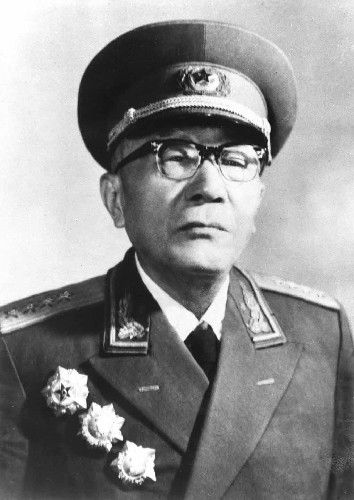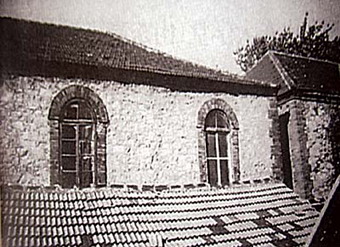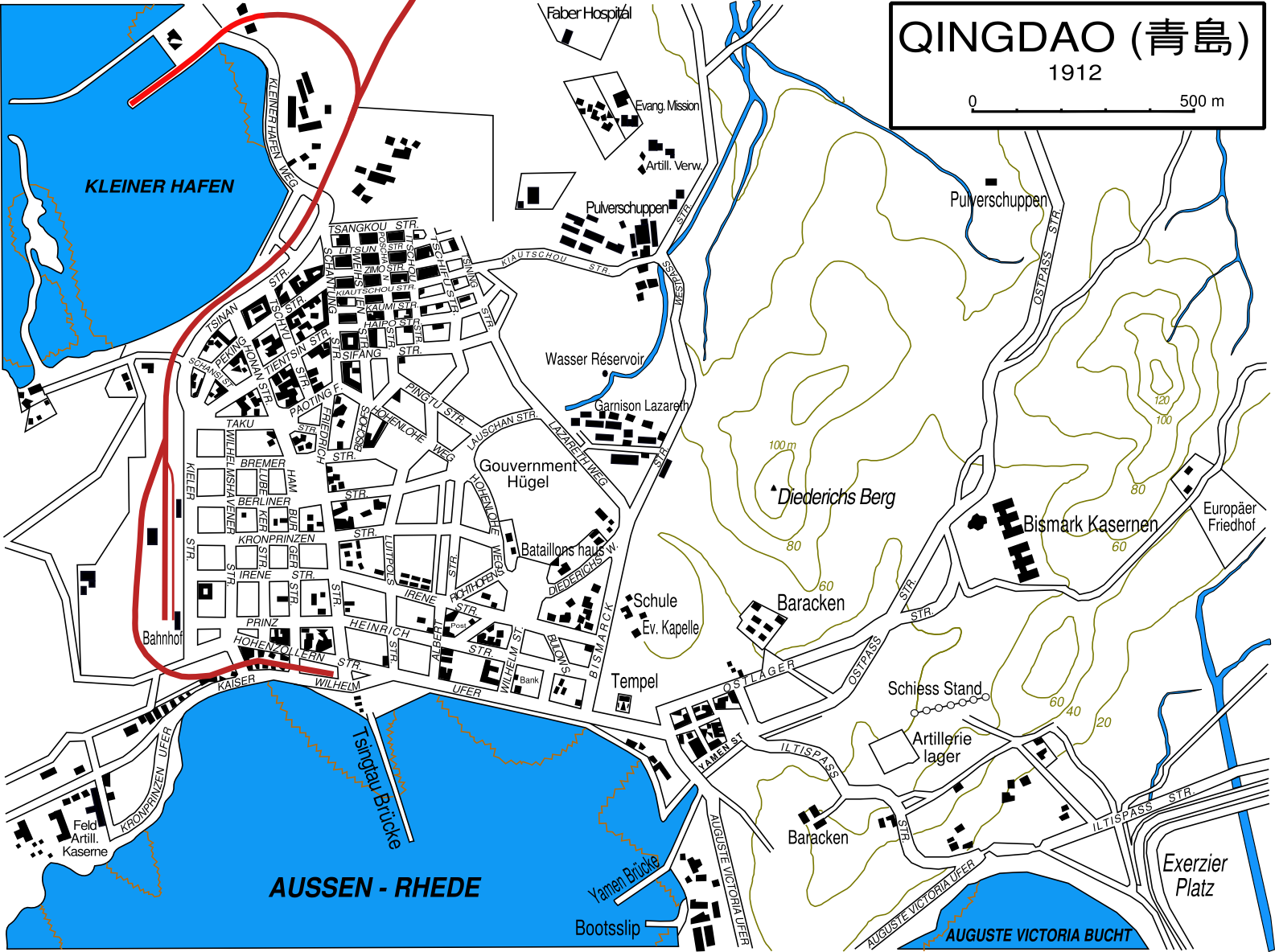|
Huang Jing
Huang Jing (; 1912 – 10 February 1958), born Yu Qiwei (), was a Chinese Communist revolutionary and politician who served as Mayor and Communist Party Chief of Tianjin municipality, Minister of the First Ministry of Machine Building, and Chairman of the National Technological Commission. He was an ex-husband of Jiang Qing, who later married Mao Zedong, and the father of Yu Qiangsheng, a top Chinese intelligence officer who defected to the United States in 1985, and Yu Zhengsheng, the fourth-ranked member of the 18th Politburo Standing Committee. Early life and revolution Yu Qiwei was born in 1912 to a prominent family in Shaoxing, Zhejiang Province. His uncle later served as Minister of National Defense of the Republic of China on Taiwan. The chemist Zeng Zhaolun was also his uncle. Yu enrolled in Shandong University in Qingdao, majoring in physics. At the same time, he spent significant amount of time in underground political activism for the Chinese Communist Party. Whi ... [...More Info...] [...Related Items...] OR: [Wikipedia] [Google] [Baidu] |
Party Secretary Of Tianjin
The secretary of the Tianjin Municipal Committee of the Chinese Communist Party is the leader of the Tianjin Municipal Committee of the Chinese Communist Party (CCP). As the CCP is the sole ruling party of the People's Republic of China (PRC), the secretary is the highest ranking post in Tianjin. The secretary is officially appointed by the CCP Central Committee based on the recommendation of the CCP Organization Department, which is then approved by the Politburo and its Standing Committee. The secretary can be also appointed by a plenary meeting of the Tianjin Municipal Committee, but the candidate must be the same as the one approved by the central government. The secretary leads the Standing Committee of the Tianjin Municipal Committee, and since at least 2002, the secretary has consistently been a member of the CCP Politburo. The secretary leads the work of the Municipal Committee and its Standing Committee. The secretary is outranks the mayor, who is generally the deputy s ... [...More Info...] [...Related Items...] OR: [Wikipedia] [Google] [Baidu] |
Huang (surname)
Huang (; zh, t=Wiktionary:黃, 黃, s=wikt:黄, 黄, c=, p=, first=t) is a Chinese surname. While ''Huáng'' is the pinyin romanization of the word, it may also be romanized as Hwang (Korean surname), Hwang, Wong (surname), Wong, Waan, Wan, Waon, Hwong, Vong, Hung, Hong, Bong, Eng, Ng (name), Ng, Uy (surname), Uy, Wee, Oi, Oei, Oey, Ooi, Ong, or Ung due to pronunciations of the word in different dialects and languages. It is the 96th name on the ''Hundred Family Surnames'' poem.K. S. Tom. [1989] (1989). Echoes from Old China: Life, Legends and Lore of the Middle Kingdom. University of Hawaii Press. . This surname is known as Hwang (Korean name), Hwang in Korean language, Korean. In Vietnamese language, Vietnamese, the name is known as Hoàng or Huỳnh. Huang is the 7th most common surname in China. Hoang/Huynh is the 5th most common surname in Vietnam. The population of Huangs in China and Taiwan was estimated at more than 35 million in 2020; it was also the surname of more tha ... [...More Info...] [...Related Items...] OR: [Wikipedia] [Google] [Baidu] |
Shandong University
Shandong University (; SDU) is a public university in Jinan, Shandong, China. It is affiliated with the Ministry of Education (China), Ministry of Education of China. The university is part of Project 211, Project 985, and the Double First-Class Construction. The oldest of Shandong University's precursor institutions, Cheeloo University, was founded by American and English mission agencies in the late 19th century (as Tengchow College of Liberal Arts in Penglai District, Penglai). Tengchow College was the first modern institution of higher learning in China. Shandong University derives its official founding date from the Imperial Shandong University established in Jinan in November 1901 as the second modern national university in the country. Shandong University has eight campuses, all but two of which are located in the provincial capital city of Jinan. The newest of these campuses is located to the northeast of the port city of Qingdao. History Traditional Learning in Shand ... [...More Info...] [...Related Items...] OR: [Wikipedia] [Google] [Baidu] |
Ta Kung Pao
''Ta Kung Pao'' (; formerly ''L'Impartial'' in Latin-based languages) is a Hong Kong-based, state-owned Chinese-language newspaper. Founded in Tianjin in 1902, the paper is controlled by the Liaison Office of the Central People's Government in Hong Kong after the Chinese Civil War. It merged with another state-owned pro-Beijing newspaper, ''Wen Wei Po'', in 2016. History 20th century In the final years of the Qing dynasty, Ying Lianzhi, a Catholic Manchu aristocrat, founded the newspaper in Tianjin on 17 June 1902, in order to, "help China become a modern and democratic nation". The paper put forward the slogan ''"Four Noes"'' () in its early years, pledging to say "No" to all political parties, governments, commercial companies, and persons. It stood up to the repression at the time, openly criticising the Empress Dowager Cixi and reactionary leaders, and promoted democratic reforms, pioneering the use of written vernacular Chinese (''baihua''). Readership fell after t ... [...More Info...] [...Related Items...] OR: [Wikipedia] [Google] [Baidu] |
Shi Dongshan
Shi Dongshan (December 29, 1902 – February 23, 1955), born Shi Kuangshao, was one of the most prominent film directors and screenwriters in pre-Communist China, together with Chen Liting, Cai Chusheng, and Zheng Junli. His most notable film was '' Eight Thousand Li of Cloud and Moon'', released in 1947. He served in the Communist government after 1949, but was later persecuted and committed suicide in 1955. Career Shi Dongshan was born and raised in Hangzhou, Zhejiang province. At the age of 17, he left his family and relocated to Zhangjiakou, finding brief work as a radio operator. He moved to Shanghai two years later, where he became a stage designer and occasional actor for the Shanghai Film Company (Chinese: 上海影戏公司; pinyin: ''Shanghai Yingxi Gongsi'').Xiao, p. 304 By the early 1930s, Shi was one of the leading directors for the left-leaning Lianhua Film Company, along with Cai Chusheng, Sun Yu and others. Shi would later join another left-leaning studio, Yihu ... [...More Info...] [...Related Items...] OR: [Wikipedia] [Google] [Baidu] |
Qingdao
Qingdao, Mandarin: , (Qingdao Mandarin: t͡ɕʰiŋ˧˩ tɒ˥) is a prefecture-level city in the eastern Shandong Province of China. Located on China's Yellow Sea coast, Qingdao was long an important fortress. In 1897, the city was ceded to Germany. For the Germans Qingdao (Tsingtau) was a strategic trade center, port and base for its East Asia Squadron, allowing the German navy to project dominance in the Pacific. In 1914, following the outbreak of World War I, Japan occupied the city and the surrounding province during the Siege of Tsingtao. In 1915, China agreed to recognize Japan's special position in the territory through what became known as the Twenty-One Demands. In 1918, the Chinese government, under the control of the warlord Duan Qirui, secretly agreed to Japanese terms in exchange for a loan. Following the First World War, during the Paris Peace Conference, Japan secured agreements with the Allied powers to recognize its claim to the areas in Shandong, which in ... [...More Info...] [...Related Items...] OR: [Wikipedia] [Google] [Baidu] |
Zeng Zhaolun
Zeng Zhaolun (; 25 May 1899 – 8 December 1967), also known as Chao-Lun Tseng, was a Chinese chemist and politician who served as vice-minister of Education after the establishment of the Communist State in the 1950s. He was an academician of the Chinese Academy of Sciences (CAS). Biography Zeng was born in Heye, Shuangfeng County, Hunan, on January 27, 1909. His great-grandfather was the second younger brother of Zeng Guofan and a general in the Qing Empire. His father Zeng Guangzuo () was an official in the Qing Empire. His mother Chen Jiying () was the daughter of Hunan Provincial Governor Chen Baozhen and the aunt of Chen Yinke. Zeng had seven brothers and sisters. His eldest brother Zeng Zhaocheng () graduated from Harvard University. His younger brother Zeng Zhaojie () graduated from the Great China University. His younger sister Zeng Zhaoyu graduated from the University of London and was an archaeologist and museologist. After graduating from Tsinghua University in 19 ... [...More Info...] [...Related Items...] OR: [Wikipedia] [Google] [Baidu] |
Republic Of China
Taiwan, officially the Republic of China (ROC), is a country in East Asia. The main geography of Taiwan, island of Taiwan, also known as ''Formosa'', lies between the East China Sea, East and South China Seas in the northwestern Pacific Ocean, with the China, People's Republic of China (PRC) to the northwest, Japan to the northeast, and the Philippines to the south. It has an area of , with mountain ranges dominating the eastern two-thirds and plains in the western third, where its Urbanization by country, highly urbanized population is concentrated. The combined Free area of the Republic of China, territories under ROC control consist of list of islands of Taiwan, 168 islands in total covering . The Taipei–Keelung metropolitan area, largest metropolitan area is formed by Taipei (the capital), New Taipei City, and Keelung. With around 23.9 million inhabitants, Taiwan is among the List of countries and dependencies by population density, most densely populated countries. Tai ... [...More Info...] [...Related Items...] OR: [Wikipedia] [Google] [Baidu] |
Ministry Of National Defense (Republic Of China)
The Ministry of National Defense of the Republic of China (MND; ) is the ministry of the Taiwan, Republic of China (ROC), which is now based primarily in the Taiwan Area but Republic of China (1912–1949), formerly governed Mainland China prior to 1949. It is responsible for all National security, defense and military affairs of Taiwan and free area of the Republic of China, surrounding area. The MND has been headed by Minister Koo Li-hsiung, Wellington Koo since 2024. History The MND was originally established as Ministry of War in 1912 at the creation of the Republic of China (1912–1949), Republic of China. It established a military occupation operation center in Taipei, Formosa in November 1945, following the Supreme Commander for the Allied Powers Douglas MacArthur's September 2, 1945 General Order No. 1, for the surrender of Japanese troops and auxiliary forces in Formosa and the Pescadores to Generalissimo Chiang Kai-shek. It was changed to the Ministry of National D ... [...More Info...] [...Related Items...] OR: [Wikipedia] [Google] [Baidu] |
Huang Jing 12-9 Movement
Huang or Hwang may refer to: Location * Huang County, former county in Shandong, China, current Longkou City * Yellow River, or Huang River, in China * Huangshan, mountain range in Anhui, China * Huang (state), state in ancient China. * Hwang River, in Gyeongsangnam-do, South Korea People * Emperor of China, titled as Huángdì (皇帝) * Huang (surname) (黄 / 黃), Chinese surname with several Vietnamese variants * Hwang (surname) (黃), (皇), a common Korean family name Other uses * Huang (jade), a jade arc-shaped artifact that was used as a pendant * Fenghuang, mythological birds of East Asia * Huang, a character in the anime cartoon ''Darker than Black'' * Hwang Seong-gyeong, a character in the ''Soulcalibur'' video game series * Huang (Coca-Cola), a brand of Coca-Cola * Huang Harmonicas, a Chinese-based manufacturer of harmonica The harmonica, also known as a French harp or mouth organ, is a free reed wind instrument used worldwide in many musical genres, nota ... [...More Info...] [...Related Items...] OR: [Wikipedia] [Google] [Baidu] |
Politburo Standing Committee Of The Chinese Communist Party
The Politburo Standing Committee (PSC), officially the Standing Committee of the Political Bureau of the Central Committee of the Communist Party of China, is a committee consisting of the top leadership of the Chinese Communist Party (CCP) and the state, as its members concurrently hold the most senior positions within the state council. Historically it has been composed of five to eleven members, and currently has seven members. Its officially mandated purpose is to conduct policy discussions and make decisions on major issues when the Politburo, a larger decision-making body, is not in session. According to the party's constitution, the General Secretary of the Central Committee must also be a member of the Politburo Standing Committee. According to the party's Constitution, the party's Central Committee elects the Politburo Standing Committee. In practice, however, this is only a formality. The method by which membership is determined has evolved over time. In turn, the ... [...More Info...] [...Related Items...] OR: [Wikipedia] [Google] [Baidu] |
Mao Zedong
Mao Zedong pronounced ; traditionally Romanization of Chinese, romanised as Mao Tse-tung. (26December 18939September 1976) was a Chinese politician, revolutionary, and political theorist who founded the People's Republic of China (PRC) in 1949 and led the country from Proclamation of the People's Republic of China, its establishment until Death and state funeral of Mao Zedong, his death in 1976. Mao served as Chairman of the Chinese Communist Party (CCP) from 1943 until his death, and as the party's ''de facto'' leader from 1935. His theories, which he advocated as a Chinese adaptation of Marxism–Leninism, are known as Maoism. Born to a peasant family in Shaoshan, Hunan, Mao studied in Changsha and was influenced by the 1911 Revolution and ideas of Chinese nationalism and anti-imperialism. He was introduced to Marxism while working as a librarian at Peking University, and later participated in the May Fourth Movement of 1919. In 1921, Mao became a founding member of the ... [...More Info...] [...Related Items...] OR: [Wikipedia] [Google] [Baidu] |






